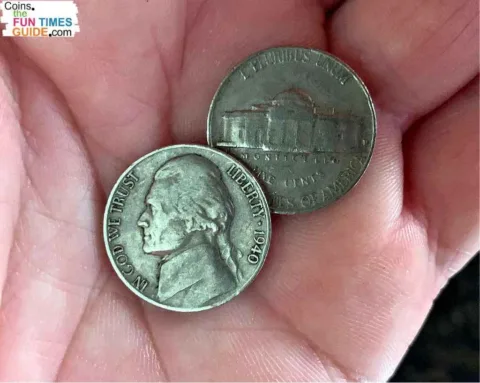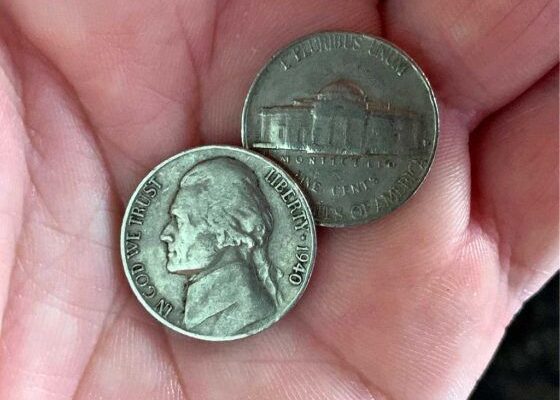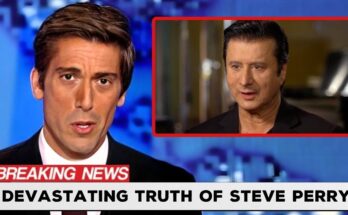The 1940 Jefferson nickel is a scarce coin worth more than face value.
So, you’re probably wondering:
- The value of your 1940 nickel
- Features to look for on 1940 nickels
Here’s everything you want to know…
How Much Is A 1940 Nickel Worth?

Old Jefferson nickels are harder than ever to find in pocket change these days. But they’re remarkably easier to find than, say, old 90% silver coins.
One reason why you can still find old Jefferson nickels in circulation is because the design remained virtually unchanged for many decades — so a well-worn 1940 Jefferson nickel may look like a well-worn 1975 Jefferson nickel at first glance.
Just think of all the opportunities people miss with these old coins. I mean, some rare Jefferson nickel values exceed $1,000! Yet, many non-collectors don’t even think to check the dates of Jefferson nickels.
For that reason, older nickels with the same design used from the Jefferson nickel’s inception in 1938 through the last of the original motif in 2003 generally go unnoticed.
If you find any 1940 nickels in circulation, they’re definitely worth holding aside — since they’re all worth more than face value. How much more?
Here are the values for each type of 1940 nickel you are likely to come across…
1940 Nickel Value (No Mintmark)
The 1940 nickel was struck at the Philadelphia Mint and doesn’t contain any mintmark — because the Philly Mint didn’t begin using its “P” mint mark on nickels until 1942.
Q: Where is the mint mark on 1940 nickels?
A: On the reverse (“tails side”) of the coin. If there is a mintmark on your 1940 Jefferson nickel, you’ll find it there. Look for a tiny “D” or “S” between the right side of Thomas Jefferson’s Virginia mansion (Monticello) and the rim.
The no-mintmark 1940 nickel is the most common of the nickels that were struck that year at any United States Mint facility. A total of 176,485,000 were produced at the Philadelphia Mint.
Even a well-worn specimen is worth between 7 cents and 15 cents.
Uncirculated 1940 nickels are worth about $2.50 and up.
The record price paid for a 1940 nickel is a specimen that was certified by Professional Coin Grading Service (PCGS) and graded MS-68 Full Steps is $6,462.50.
1940-D Nickel Value
With a mintage of 43,540,000, the 1940-D Jefferson nickel from the Denver Mint is far scarcer than the 1940 Philly nickel. However, 1940-D nickels turn up in spare change from time to time. If one lands in your hands, hang onto it!
They’re worth 10 cents to 25 cents in worn condition — much more than face value.
Uncirculated specimens are worth $3.50 or more.
The all-time record price for a 1940-D Jefferson nickel is $21,738 — the amount paid for a PCGS-graded MS-68 with Full Steps details.
1940-S Nickel Value
The scarcest 1940 nickel is the 1940-S Jefferson nickel. It’s the rarest of the 3 different business-strike nickels minted that year. Only 36,690,000 were made.
The 1940-S nickel is increasingly difficult to locate in circulation these days.
Even well-worn 1940-S nickels are worth 25 cents to $1.
Uncirculated examples fetch $5 and up.
The most ever paid for a 1940-S nickel is $5,170 for a specimen that was certified by PCGS MS-67+ with Full Steps.
1940 Proof Nickel Value
The Philadelphia Mint struck a small number of proof 1940 Jefferson nickels for collectors.
The mintage of these collectible 1940 nickels, struck by specially prepared dies on polished planchets, is a small sum of just 14,158 pieces.
A typical 1940 proof nickel is worth about $75.
However, especially nice 1940 proof Jefferson nickels retail for more than $250.
The all-time record price for a 1940 proof nickel is $18,400 for a specimen graded by PCGS as Proof-68.
IMPORTANT: What Is The Grade Of Your 1940 Nickel?
To determine the true value of your 1940 Jefferson nickel, you first need to know what condition (or grade) your coin is in.
Grab a coin magnifier and a copy of the U.S. Coin Grading Standards book. Then, watch this video to see how to grade coins yourself at home:
These are the best coin grading apps that make grading coins yourself much easier.
A List Of Rare 1940 Nickel Errors & Varieties?
While regular 1940 nickels aren’t really worth huge amounts of money unless they’re in extraordinarily good condition, errors and varieties can help increase the value of even well-worn coins.
Here’s a look at some of the more notable errors and varieties on 1940 nickels and what they’re worth…
1940 Doubled Die Nickel Error
Generally speaking, these are the most popular varieties and also among the most expensive. Additionally, they’re quite rare, too. Even the most dedicated pocket change searchers can go for years and never find a true doubled die variety on any coin.
As for doubled die 1940 nickels, you’ll be looking for a long time before you find one — if ever. Currently, there aren’t any major doubled dies known for the 1940 nickel. But that doesn’t mean you can’t be the first to discover a new variety!
Any minor doubled dies that can be found on 1940 nickels are relatively obscure and could trade for $25 to $100 or possibly more — depending on the location and magnitude of the variety.
1940 Die Cud / Die Crack Nickel Error
As coin dies age, they often begin cracking. And if these cracks occur near the rim of the coin, the result will be a raised chunk of blank metal that appears connected to the rim.
Errors like this are known as cuds. They’re one of the most valuable types of die cracks.
A 1940 Jefferson nickel with a die cud error can be worth $50 to $100 or even more — depending on the size and location of the cud.
Die cracks exhibiting jagged lines or other raised anomalies elsewhere on the coin also enhance the value. Coins with prominent die cracks across the face of the coin or through the lettering are often quite valuable — with many die crack errors snagging $10 to $50.
1940 Off-Center Strike Nickel Error
When a coin isn’t perfectly centered on the dies or the dies are misaligned, the result will be an off-center strike.
The value of error coins like this depend largely on how far off center the strike is — and also if the coin’s full date is visible.
A 1940 nickel that’s 5% to 10% off-center may bring $10 to $20. One that’s 50% off-center and still shows its full date and mintmark can go for $100 and up.
It should be noted that coins with only a minor off-center strike (where the rim appears thicker on one side of the coin than the other) are very common errors and don’t have any extra value.
1940 Repunched Mintmark Nickel Error
In the 1940s, United States Mint coiners punched mintmarks onto individual dies — meaning that mint marks sometimes appear in slightly different locations or positions on the 1940 Jefferson nickel.
Sometimes, the mintmark was punched multiple times because the first attempt was in the wrong location or was positioned incorrectly.
Most 1940 nickels with repunched mintmarks are worth $3 to $5 — though pieces with dramatic mintmark varieties can bring much more.
Doubled and tripled mintmarks are highly desirable error varieties. It pays to check the backs of all 1940 nickels for the “D” and “S” mint marks to see if there’s any sign of multiple strikes — they can be worth $50 to $100 or more.



